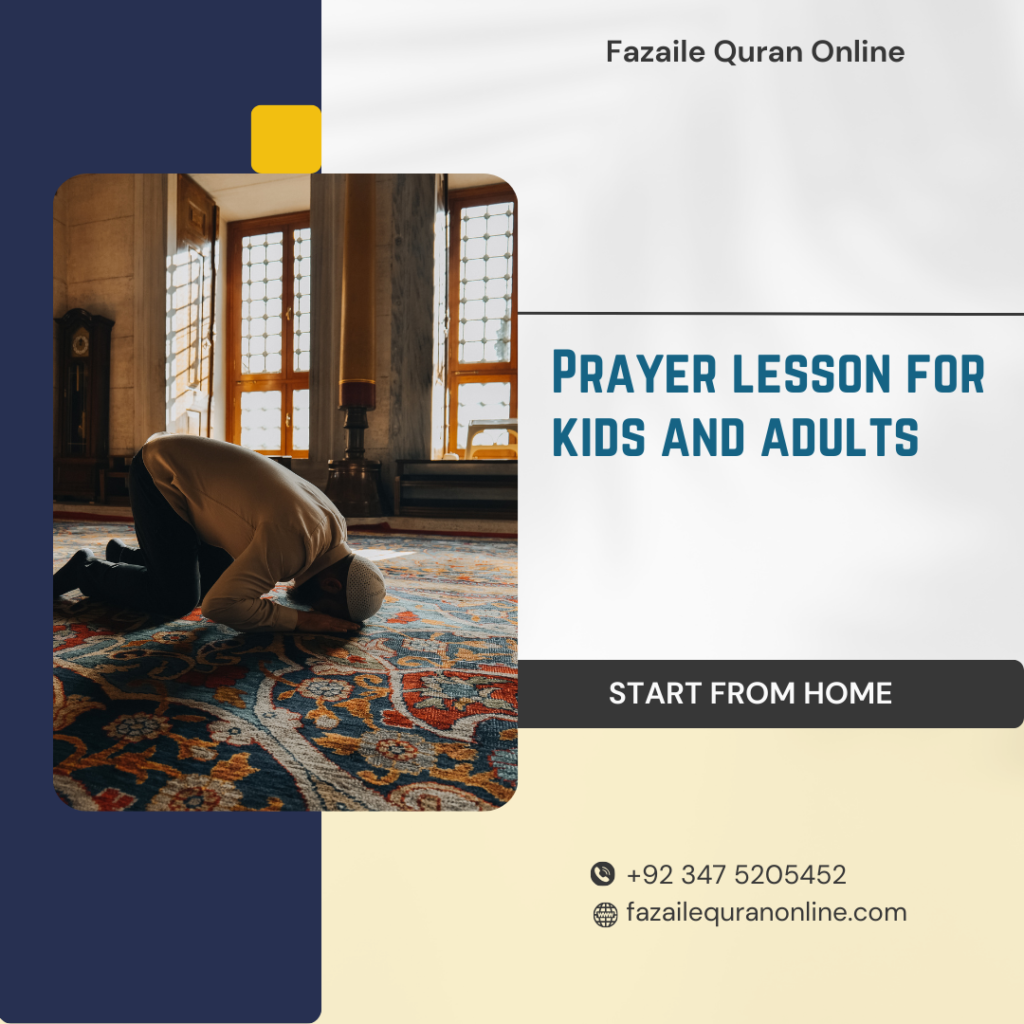Praryer Lesson for Kids and Adults
Overview of the Prayer Lesson Pillar of Islam
Islam is the divine and true religion of Allah, the Almighty. It is not merely a religion but a comprehensive way of life that provides guidance for all aspects of existence, both in this world and the Hereafter. Islam, referred to as Deen, offers divine instructions that shape beliefs, rituals, social transactions, and moral values. It provides a complete code of conduct for individuals to follow, ensuring a harmonious and righteous life. At the core of Islam are the Five Pillars, which are fundamental acts of worship and practice that form the foundation of a Muslim’s faith and actions.

Key Aspects of Islam as a Way of Life:
-
Divine Guidance for Life:
- Islam is a complete way of life, guiding Muslims on how to live righteously, interact with others, and develop a strong relationship with Allah. It offers instructions for both worldly success and spiritual fulfillment.
-
Beliefs, Rituals, Transactions, and Moral Values:
- Beliefs: Islam teaches a set of core beliefs, including belief in Allah as the One True God, belief in His Angels, His revealed books, His Prophets, the Day of Judgment, and divine predestination.
- Rituals: Islam prescribes specific acts of worship, such as daily prayers (Salah), fasting (Sawm), and giving charity (Zakat), that help maintain a strong connection with Allah and purify the soul.
- Transactions: Islam provides ethical guidelines for financial transactions, social interactions, and relationships, emphasizing fairness, honesty, and justice.
- Moral Values: Islam encourages high moral standards, including kindness, honesty, humility, patience, and respect for others.
-
The Five Pillars of Islam:
-
The Five Pillars represent the core principles and practices that every Muslim must adhere to. These pillars form the foundation of a Muslim’s faith and actions, helping to build a strong connection with Allah and a peaceful, just society.
-
Shahada (Faith):
- The declaration of faith that “There is no god but Allah, and Muhammad is His messenger.” This testimony affirms one’s belief in the oneness of Allah and the finality of Prophet Muhammad (PBUH) as His messenger.
-
Salah (Prayer):
- Performing the five daily prayers at prescribed times is one of the most important rituals in Islam. Salah helps Muslims maintain mindfulness of Allah and discipline in their lives. The five prayers are Fajr, Dhuhr, Asr, Maghrib, and Isha.
-
Zakat (Charity):
- Zakat is the mandatory giving of a portion of one’s wealth to the needy. It purifies the wealth of the giver and helps foster a sense of community and social responsibility. It is typically 2.5% of a Muslim’s savings annually.
-
Sawm (Fasting during Ramadan):
- During the holy month of Ramadan, Muslims fast from dawn to sunset. This fast includes abstaining from food, drink, and other physical needs. Sawm teaches self-discipline, empathy for the poor, and spiritual purification.
-
Hajj (Pilgrimage to Mecca):
- Every Muslim who is physically and financially able is required to perform Hajj at least once in their lifetime. This pilgrimage to Mecca involves several rites and is a profound demonstration of devotion and unity among Muslims from all around the world.
-
-
A Complete Code of Life:
- Islam guides Muslims in all aspects of life, from personal conduct to community involvement, from social interactions to spiritual practices. The teachings of Islam offer principles that foster peace, justice, and compassion.
-
The Life Hereafter:
- Islam emphasizes the importance of preparing for the life after death. The actions in this world determine one’s fate in the Hereafter, where people will be judged based on their faith and deeds. Belief in the Day of Judgment and the life after death is essential for Muslims to guide their actions in this life.
Conclusion:
Islam is a holistic way of life that not only defines one’s beliefs and rituals but also governs their social, moral, and ethical practices. The Five Pillars of Islam form the foundation of this way of life, acting as guiding principles that shape a Muslim’s relationship with Allah and others. By following these pillars, Muslims fulfill their spiritual duties, maintain social justice, and work toward achieving peace in this life and the Hereafter. Islam, as a Deen, provides the divine code that ensures a balanced and fulfilling life.
